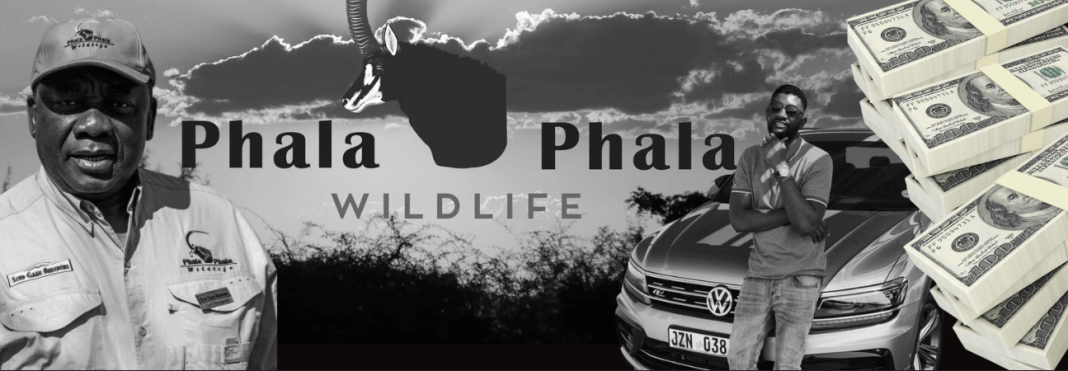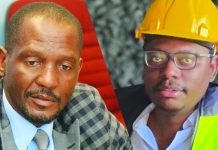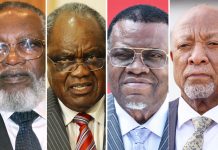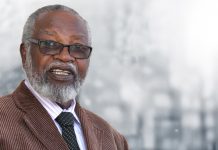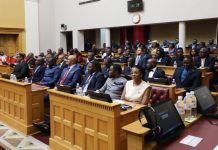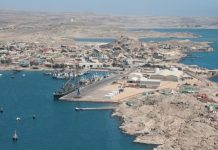Key Takeaways
- In June 2020, months after the robbery at President Cyril Ramaphosa’s Phala Phala farm, the alleged mastermind skipped the country with the aid of two dodgy forex traders – a certain Papa J and a man named Prince.
- AmaBhungane’s investigation reveals their identities, their roles in the saga, and Papa J’s surprising connection to former President Jacob Zuma.
- Meanwhile a leaked recording raises more questions about the investigation into the theft.
In June 2020 Imanuwela David escaped from South Africa to Namibia, about four months after his In June 2020 Imanuwela David escaped from South Africa to Namibia, about four months after his alleged involvement in the theft of millions of dollars hidden in a sofa at President Cyril Ramphosa’s Phala Phala game farm.
According to a Namibian police report seen by amaBhungane, when David was questioned by Namibian police, he claimed to have paid a certain “Papa J” R50 000 “to arrange people in Namibia and RSA to smuggle him into Namibia”.
AmaBhungane has established the identity of Papa J, whose real name is Mfundo Jele, as well as one of the individuals in the car that took David to the border – a man named Prince Mazibuko.
According to the report, signed by the former head of the Namibian Criminal Investigations Directorate (CID) Nelius Becker on 21 June 2020, David told Namibian authorities that he approached Jele, who allegedly contacted an unnamed Zambian, who in turn roped in then acting chief executive of the Namibian state-owned fisheries company Fishcor, Paulus Ngalangi.
Ngalangi allegedly collected David from Noordoewer on the Namibian side of the border, after David illegally crossed the Orange River by canoe.
The report suggests that Namibian intelligence acted quickly after picking up information about David being “smuggled” into the country. He was swiftly arrested after a police officer, Sergeant Hendrik Nghede, admitted to accompanying Ngalangi to collect David from Noordoewer.
“Cash is my middle name”
Citing David, the report states that Jele worked as head of intelligence in Durban and was a bodyguard of the “Mayor of Durban, Mr Ncwane”, though Durban has never had a mayor by that name.
AmaBhungane could not find evidence of Jele having worked in intelligence, but Jele’s social media pages reveal a man who flaunts his cash and is keen to show off his proximity to former president Jacob Zuma.
The first photo posted on his Instagram page from September 2020 is of him at Zuma’s home with the caption “My President”. More pictures of him and Zuma can be found on his TikTok account. In one video slide, the two are captured at a dining table sharing a meal.

Jele’s page also includes videos of him denouncing Zuma’s arrest around the time of the July Unrest.
In one photo Jele is standing in front of a dressing table stacked with money. The photo is captioned, “Cash is my middle name”.

In another video in which Jele’s voice can be heard, the camera pans over bricks of R200 and R100 notes stored in a gym bag and a box.
Jele is the owner of WDG-Africa, or the Wealth Drive Group – a forex investment business which seemingly has a footprint in other parts of the continent.
When amaBhungane tried to contact Jele on the number listed in the Namibian police report, the person who answered claimed it was the wrong number, even though it matched the one listed on Jele’s Facebook page.
However, Jele’s associate, Prince Mazibuko, was more forthcoming.
According to the police report, Mazibuko was in the Hyundai i20 that “offloaded” David at the South African border town of Vioolsdrift. AmaBhungane understands that Mazibuko was driving the car.
Responding to questions sent via email, Mazibuko confirmed that he was approached by his childhood friend, Jele, who asked him to help arrange transport for “his friend” David.
Mazibuko, also a forex trader who is popular on social media, is facing 194 counts of theft and fraud after he allegedly scammed 40 people of R735,000 through his company, Born Rich Group.
He told amaBhungane that he and two friends collected David in Pretoria and, though Jele paid him R20 000 for the trip, he denied knowingly being involved in a scheme to smuggle David out of the country.

“During the time I first met this David guy, I got a call from a friend of mine (Jele) who stays in KZN and I was in JHB at the time. He called and asked for my help to get an Uber for his friend who is supposed to go to a meeting in Vioolsdrift,” said Mazibuko.
Mazibuko said he “made a few calls to try and help”, but that he ended up offering to drive David himself because he needed the extra money. “At the time I had just got a new born child.”
“Dropped suspension”
Namibian authorities received Mazibuko’s details from Colonel Jorine Edwards, the attaché of the South African Police Service (SAPS) at the High Commission in Windhoek.
The Namibian police report states: “Information has it that the South African Police saw a vehicle which had ‘dropped suspension’ driving out on the Rooiwal road at Vioolsdrift. They decided that this was suspicious as this is a gravel road that was not in a good shape and not suitable for such a vehicle. They decided to investigate and the vehicle and persons inside it were searched.”
Mazibuko was one of four occupants in the Hyundai i20. He confirmed this to amaBhungane, saying: “The police did stop us at the time because of where I was parked, they asked what were we waiting for, as a person who had helped to transport this guy, I told the truth that this guy [David] is having a meeting this side and he was busy communicating with the people who he was supposed to meet.”
The group did not return to Gauteng with David. According to Mazibuko, David said he would stay behind because the people he was meeting had not arrived.

Mazibuko claims he was an unwitting accomplice to David’s plans. He stated emphatically that he “had no personal relationship with this David guy, before and after”, and said he was not aware that David was suspected of having broken into the president’s home.
“I never assisted him in crossing as I didn’t even know he was going there to do such. It’s so painful to me right now to even know I was travelling with someone of that nature.”
Both Jele and Mazibuko were flagged in the police report as “possible leads that can be followed up in South Africa”. It is not clear if this information was ever shared with South African authorities and whether they acted on it.
Questions sent to the South African High Commission in Windhoek were unanswered at the time of publication.
Mazibuko told amaBhungane that he had not heard from the police since the incident in June 2020.
Papa J’s version
When we eventually reached Jele, he claimed he no longer used the number in the Namibian police report and the person who answered amaBhungane’s call a week ago was not him.
His version of events backed up much of what Mazibuko told us – but his own story appeared somewhat thin in places.
Jele said he did not know where the story of him working in intelligence or having been the bodyguard for a Durban mayor originated from. He said he had always been a “businessman”.

He told amaBhungane that in June 2020 he received a call from a man from whom he bought a lot of vehicles in 2018. This man, named only as Saqeeb, owned a dealership in Benoni and they had formed a friendly relationship.
The car dealer told Jele that a friend of his called Imanuwela David needed a driver to take him to an urgent meeting in Vioolsdrift, on the border with Namibia.
Amabhungane has identified Saqeeb as Saqeeb Shahaboodien, who, according to a News24 report owned the Benoni motor dealership where David had bought six cars for cash, including a VW Golf 7R. The cars were allegedly paid for in bundles of $10 000.
Attempts to reach Shahaboodien were not successful, however a former employee confirmed that both David and Jele had bought several “top class” vehicles from the dealership before it closed.
While the former employee said David paid for the cars in dollar bills, he was not sure if Jele paid in cash.
“Saqeeb had contacts to change currencies and stuff like that,” said the former employee.
Jele says he called his friend Mazibuko for help arranging David’s transport because the latter was in Johannesburg at the time. Mazibuko told him that since David was willing to pay a premium, he would drive David. He told Jele that he had just fathered a baby and was running low on cash.
Jele told amaBhungane that David sent the money through an intermediary called Alex, a Nigerian man who owned a boutique in Pretoria. David claimed he had a problem with his bank account and said Alex was his business associate.
Jele then forwarded this money to Mazibuko. He said he had never met David in his life and had only facilitated payments because Mazibuko was involved. They were in high school together.
“The only reason I agreed [to facilitate the payment] is because Prince is my friend. Had it just been an Uber driver, I would have just given him the guy’s number and not been involved,” he explained.
Jele said that when David arrived in Vioolsdrift, he asked Jele to send a further R50 000 to a person that he remembers being Paulus Ngalangi, the Fishcor executive who collected David on the Namibian side of the border.
A day after he made the transfer, he got a call from Ngalangi telling him David had been arrested.
When Jele eventually got through to David he wanted Jele to link him up with Alex (the Nigerian boutique owner in Pretoria) so he could inform him about the arrest.
AmaBhungane has identified this person as Alex Kaadi. Kaadi admitted to knowing David but said he did not know anyone called Jele and denied ever helping to facilitate payments for David’s escape.
[sidebarContentQuote align=right]If you want to help us strengthen our independence, please consider a donation, whether large or small, once off or monthly.[/sidebarContentQuote]
Kaadi said David, who he has known since 2019, was “not really his friend”, nor a business associate, but was a customer who bought clothes from him and had asked him to fix his blue VW Golf 7 in 2021.
“He had a girlfriend close to my shop, he came to see his girlfriend and was always here,” he said.
Kaadi said David only asked him to make payments on two occasions but said he did not remember exactly who was paid or what year the requests were made.
“There [were] about two people he asked me to send money to… I think R10 000 or R5000,” said Kaadi.
When asked if the figures could have matched the alleged payments to Mazibuko and Ngalangi, and whether the payments happened just a day apart, Kaadi said, “It was a long time [ago]. I can’t remember.”
However, he said David paid him back within one or two days through the girlfriend.
Jele said he had no contact with David since June 2020.
Money on Instagram
Jele said the pictures of cash on his Instagram posted in September 2020 were actually taken in 2018 but that that was not his money.
He claimed that in 2018 Saqeeb had completed a sale of a vehicle and the client paid him in cash.
“He came to my place with someone else to wait for another group of individuals to accompany him because he did not want to travel with that much money alone,” he told amaBhungane.
“I was young and stupid so I took photos and posted them. There are witnesses that can confirm this but that was not money from the proceeds of crime and it wasn’t mine.”
Zuma
Jele said Zuma was someone he met through a former employee who was indirectly related to Zuma via the Mzobe family.
According to Jele, he would visit Zuma and have friendly conversations about the history of the country and the Zulu people, but had no political or business relationship with the former president. He said he took pictures with Zuma because he admired him.
Jele said he didn’t know anything about the break-in at President Ramaphosa’s home and was adamant that if investigators were to look at his phone and bank records his story would be corroborated.
In response to questions from amaBhungane seeking clarity about the relationship between Zuma and Jele, Zuma’s spokesperson Mzwanele Manyi responded with a series of laughing emojis followed by #PhalaPhalaFarmGate.

“You guys are desperate to change the narrative,” said Manyi, adding that this was his official response. “You can quote me.”
New recording
Meanwhile, a leaked recording purporting to be of David being interrogated by two unidentified South African law enforcement officials, has raised more questions about both the amount stolen and about the “off the books” investigation following the theft.
The interrogation appears to have taken place in a vehicle in 2021, the year following the burglary.
The alleged details of the Phala Phala burglary were first exposed in an affidavit by former spy boss Arthur Fraser, in which he accused Ramaphosa and the head of the VIP protection unit, Wally Rhoode, of criminality in concealing the theft and in the detention and interrogation of some of the suspects.
Ramaphosa has largely kept mum on the allegations, except to acknowledge that the burglary did take place, and to state that the money that was stolen was not from the proceeds of crime and was far less than what Fraser claimed.
Fraser did not put a fixed figure to the stolen cash, saying the information he received from a member of Rhoode’s team was “speculated to be in the region of approximately about US$4 million to US$8 million”.
In the audio recording, David is heard telling claiming that the figure was much lower because they only stole a portion of the cash hidden in the sofa at the farm.
He tells his interrogators that a cleaner working at Ramaphosa’s directed him to the money that was stored in the leather sofa and brought him samples of the cash to prove that it was authentic.
He describes the operation as “easy” and says it required no violence.
He tells the unidentified men that the robbers only took about $800 000 (about R13-million) packaged in eight wrapped parcels containing $100 000 each.
“That lady [the cleaner] said don’t take everything because you are dealing with the president, they are going to fuck you up and they are going to fuck me up,” he explains.
The money was shared between four people including the cleaner, who received $200 000. David admits to taking $300 000 (nearly R5-million).
He also gives details about how he crossed into Namibia, saying he left because he sensed that “this thing is too hot”. David claims he was arrested because someone who did not get paid from the stolen cash snitched on him.
From the description in the recording, it appears that police raided a Milnerton property where David and other suspects were staying in 2020 after the robbery.
David describes the raid, saying police beat the suspects and even took out the “whole ceiling of the house” looking for the money, but the suspects told the police that it had been spent. He claims that they were dumped “in the bush” after the raid.
Interestingly, the recording includes the claim that David’s father worked for the state and was somehow connected to the Namibian vice-president.
The content of the recording suggests the fallout from Fraser’s disclosure could potentially be embarrassing for the Namibian political leadership, not just for Ramaphosa.
Recall that David was collected from the border by Ngalangi, the Fishcor executive.
Notably, CID chief Becker, who compiled the report on David, was one of the key investigators of the so-called Fishrot scandal, which saw millions of Namibian dollars in fishing quota fees collected by Fishcor diverted to executives, but with a significant cut going to the ruling party, SWAPO.
It is also notable that Becker was unexpectedly moved across from the CID to the police’s forensics division in mid-July 2020, a month after David’s arrest – a move that has raised eyebrows since he had been in charge of the CID for less than a year.
“No man’s land”
Since news of Fraser’s complaint broke, South African officials, contrary to claims made by Namibian police, have denied receiving a request from the Namibians for mutual legal assistance in investigating David.
The Namibian Police Force’s (Nampol) Inspector-General, Sebastian Ndeitunga released a statement saying their officers met with their South African counterparts in “no man’s land” in the Noordoewer-Karas border region on 19 June 2020, shortly after Imanuwela’s arrest.
The meeting is corroborated in the Namibian police report, though the identity of the South Africa official that engaged Namibian authorities to set up the meeting in “no man’s land” is blacked out of the police report.
Ndeitunga said the officials shared “operational information pertaining to Mr David Imanuwela and other Namibian nationals” suspected of involvement in the break-in at Ramaphosa’s farm.
After identifying “individuals, bank accounts, and various properties including lodges, houses and vehicles suspected to have been purchased with the proceeds of crime”, and having obtained a preservation order, Namibian authorities turned to South Africa’s ministry of justice to “to confirm whether or not a crime was registered in South Africa”.
However, according to Ndeitunga’s statement, “no response was received from South African authorities, resulting in the cancellation of the preservation order and release of assets”.
In his affidavit, Fraser claimed that after the robbery Ramaphosa asked for assistance from Namibia’s President Hage Geingob in apprehending David. “This resulted in Major General Rhoode travelling to Namibia where the suspect was interviewed and stolen monies seized from him. Major General Rhoode had travelled to Namibia utilising official government resources and had not been legally processed through border control.”
A commissioner of the Namibian police’s Special Branch who attended the no man’s land meeting, and whose name is also redacted, confirmed that David “was the mastermind behind the burglary and supplied some names and photographs of his accomplices”, according to the police report.
The report added: “Due to the sensitivity of the matter and the envisaged fallout it will create in South Africa they requested that the matter is handled with discretion.”
It also noted that the two presidents were “allegedly” engaged in ongoing discussions.
Geingob has strongly denied allegations that he assisted Ramaphosa in covering up the theft.
Justice Minister Ronald Lamola’s spokesperson, Chrispin Phiri said there was a specific process that countries had to follow when applying for mutual legal assistance which involved liaising through the country’s respective embassy or high commission.
“We can confirm that, to date, all requests for mutual legal assistance have followed these processes without any complications between the two states Namibia and South Africa. We can categorically state that, to date, there is no official record of this specific request,” Phiri said in a statement.


